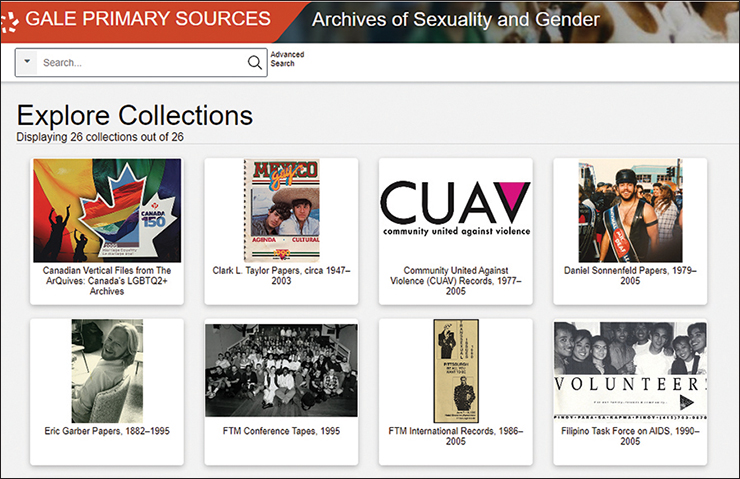Archives of Sexuality and Gender: Community and Identity in North America | eReview
As with the previous modules in the series, this collection of primary resources is exceptional, with unique content and user-friendly features. It is an excellent resource for researchers of gender and women’s studies, LGBTQIA+ studies, cultural studies, and social history. Moreover, it expertly expands upon the five earlier collections of the archives and pairs well with other Gale primary resources.
Archives of Sexuality and Gender: Community and Identity in North America
CONTENT This sixth collection in Gale’s Archives of Sexuality and Gender series focuses on sexual identity, LGBTQIA+ community-building, gender, and diversity, equity, and inclusion in Canada, Mexico, and the United States during the 20th century. The database’s wide range of topics includes activism and social justice, disability, interactions between sexuality and religion, and gender and sexuality in ethnic communities. The approximately one million pages of materials are drawn from 24 collections in four major archives: GLBT Historical Society (San Francisco); ArQuives—Canada’s LGBTQ2+; Biblioteca Daniel Cosío Villegas, El Colegio de México; and Elihu Burritt Library (Central Connecticut State University). Formats include monographs, papers, periodicals, pamphlets, videos, audio recordings, cartoons, and vertical files. The archive emphasizes individuals and personal papers rather than organizations and large periodical collections.
USABILITY From the home page, users can search by either entering a term in the basic search box or by using the various advanced search options. Advanced search enables searching by keyword, document, publication, subject, or author, with 10 different search limiters. The advanced search page also has publication search and topic-finder tools to assist with search results. Publication search allows users to pinpoint searches by publication, publication territory/country, city, language, or date. The topic-finder tool displays the top results of keyword and subject searches in tile or wheel graphics.
Users can view and select individual collections from the thumbnail collections facet on the main page. Collections can be filtered by content, document, language, or source. One can search within a collection or view all documents within that collection. All individual publications in a collection are listed and can be easily accessed from provided links. The quality of scans is outstanding, with both text and visual materials easy to read and myriad viewing options. All entries can be downloaded, cited, and printed. They can be sent to Google Drive or OneDrive or emailed.
Navigating within the database is seamless and intuitive. Response time is immediate, no matter the search, collection, or publication selected. Cross-searching is enabled when libraries own or subscribe to other Gale primary sources.
PRICING Pricing begins at $12,153 for the collection, with a hosting fee that starts at $110 annually. Public library pricing is based on population served and starts at $8,102 for the collection, with a hosting fee that starts at $70 annually. Academic library pricing is based on an institution’s full-time enrollment and other institutional variables. Subscriptions are available upon request. Institutions holding two or more Gale Primary Sources collections receive complimentary access to the Gale Primary Sources cross-search platform. A free trial for the product can be requested at gale.com/c/archives -of-sexuality-and-gender-community-and -identity-in-north-america.
VERDICT As with the previous modules in the series, this collection of primary resources is exceptional, with unique content and user-friendly features. It is an excellent resource for researchers of gender and women’s studies, LGBTQIA+ studies, cultural studies, and social history. Moreover, it expertly expands upon the five earlier collections of the archives and pairs well with other Gale primary resources.
ALREADY A SUBSCRIBER? LOG IN
We are currently offering this content for free. Sign up now to activate your personal profile, where you can save articles for future viewing










Add Comment :-
Comment Policy:
Comment should not be empty !!!